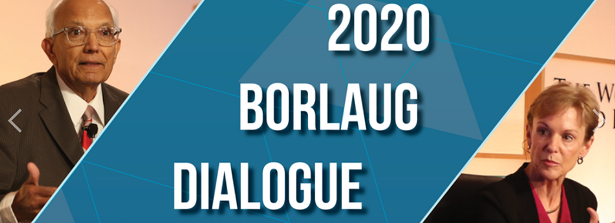
The 2020 International Borlaug Dialogue (October 12-16), will be offered in a week of half-day sessions in a virtual setting. The theme is “Breaking New Ground – Building Resilience Today for Improved Global Food Systems Tomorrow”. Through a series of live and on-demand components, registrants will hear from leaders and champions, take deep dives into key interdisciplinary topics, and interact with new and familiar partners and colleagues.
Each day, three types of live sessions will be offered: a panel discussion, a roundtable session and a workshop. Participants will connect through a discussion board feature. This year, the students of the Global Youth Institute will participate directly in presentations and discussions on the key topics: Climate Change, Equity & Access, Nutrition, and Finance & Investment in the context of resilience.
The format
Main Stage Panel/Keynotes – Key Messages from Headline Speakers
- High-level panels and keynotes will address tough questions and elevate innovative solutions.
- Sessions will be publicly available for anyone to stream, as in past years.
- Registered participants will have the unique opportunity to interact with speakers through Q&A sessions.
Roundtable Discussions – Diverse Stakeholders Take Deeper Dives
- Comprehensive discussions by a designated group of 10-15 experts and students (of the Global Youth Institute) on one of the 4 major topics.
- Registered participants can watch the discussion live and interact through Q&A sessions.
- Opportunity for reflection and interaction with other participants.
Workshop – Intensive Exploration of Key Tools and Solutions
- Small group, interactive workshops will provide the opportunity for registered participants to collaboratively define key issues, explore problems, and generate potential solutions.
- Opportunity to better understand and engage with policy and consider the policy and scientific tools to enhance the process of translating science into action.
Virtual Tours – Visit Agriculture and Technology Sites
- Registered Dialogue participants may take part in virtual tours of innovative farms and agricultural processing facilities in the Iowa area.
Discussion Board – Connect with Colleagues
- Interact with participants through an online discussion portal to share resources and facilitate networking and collaboration.
Side Events – Interact and Network
- A prominent feature, side events provide a space for organizations and initiatives to demonstrate work, promote further dialogue and engage attendees.
The International Borlaug Dialogue and UN Committee on World Food Security are working to schedule this year’s events to enable participation in both conferences to the greatest extent possible.
The vision
The combined challenges of climate change and a global pandemic magnify the weaknesses in our current global food systems, causing the global food security community to confront the need to feed up to 10 billion people by 2050. Achieving equity, sustainability and improved nutrition in the food systems requires swift evolution in our definitions, research, plans, approaches and practices to build resilience. The present examination of the global food systems and subsequent actions must address the growing pressures on natural resources, food supply, technology, labor and capital in order to break new ground. Building upon the momentum of the Sustainable Development Goals, the drive to enact global change through collaborative innovation is greater now than ever before.
We invite you to envision resilient food systems that are responsive, accessible, and fair to all. Creating resilience in food systems has become a core principle in global discussions. During the Dialogue, we will tackle structural vulnerabilities requiring immediate attention and reform. Resilient food systems equip stakeholders with the capacity to recover from shocks and mitigate the impacts of stressors such as pandemics, climate change, natural resource degradation, volatile markets, conflict, and natural disasters.
Shifting from reactive responses to proactive approaches is key to transforming the global food systems.
The content
The Dialogue will examine four major vulnerabilities or “cracks” in food systems: Climate Change, Finance & Investment, Nutrition, and Equity & Access. These concentrations will focus on actions and outcomes that reflect threats and opportunities in strengthening food systems resilience.
Climate Change
- Explore the complex inter-relationship of food-systems, resilience and climate.
- Address impacts of climate variability on agricultural productivity and food availability.
- Consider the potential of innovations such as carbon sequestration, regenerative agricultural systems and agroecology in mitigating climate change.
Finance & Investment
- Examine how investment in high-risk, long-term research efforts helps meet development goals.
- Increase investment in technology and innovation for high-impact, evidence-based solutions.
- Discuss compounding factors needed to cultivate and support success in investment ventures (e.g. infrastructure, education, government stability, liquidity for small- to mid-size enterprises, etc.).
Nutrition
- Examine malnutrition at the local, regional and national levels, including disproportionate mortality rates based on race, class and social status.
- Consider long-term responses to malnutrition to address broader health and development goals.
- Recognize how investments in social programs that support nutritional development impact vulnerable groups, especially children.
Equity & Access
- Address disproportionate impacts of food systems shocks on under-resourced communities, including farmers, daily wage earners, frontline workers and many others.
- Recognize disadvantages faced by many in the Global South due to historical marginalization.
- Identify barriers to knowledge and resource acquisition and how they vary in different locations, cultures, and circumstances (e.g. language, gender, technology).
- This event has passed.

